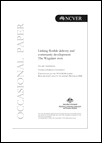Description
NCVER's Academic Scholarship Program provided the opportunity for an investigation into the flexible delivery of vocational education and training (VET) in a remote Indigenous community. Through evaluation of the delivery of the Sunrise Health Service's Youth Worker Training Program from the perspective of the Wugularr community, this paper identifies the benefits of community engagement and flexible delivery.Summary
About the research
Building the research capacity of the vocational education and training (VET) sector is a key concern for the National Centre for Vocational Education Research (NCVER). To assist with this objective, NCVER supports an academic scholarship program, whereby VET practitioners are sponsored to undertake university study at honours’, master’s or doctorate level.
Stuart Anderson received an academic scholarship in 2008 to assist with his Master’s of Education at Charles Darwin University. Stuart is a Lecturer and Course Co-ordinator in Alcohol and Other Drugs, Youth Work at Charles Darwin University. His research investigates the flexible delivery of VET in Wugularr, a remote Indigenous community near Katherine in the Northern Territory.
As part of its core business, Charles Darwin University offers a range of VET training programs to Wugularr. One of these programs is the Sunrise Health Service’s youth worker training program.
This paper evaluates the program from the community’s perspective. The lessons learned, which are applicable to the wider VET sector, are also identified.
Key messages
- Overall, the participants were happy with the teaching and learning provided by the university but were less satisfied with its approach to engaging their community in the process.
- Building a relationship with the community is vital to improving VET practice in remote communities. This can be achieved by:
- customising approaches to delivery and assessment so they recognise community languages and support community-oriented activities
- incorporating digital technologies in teaching and learning
- understanding that the cultural and family priorities of participants and building their trust tend to come before VET training in the community
- being in it for the long haul and teaching skills not only applicable to their current workplace but also to the future.
Tom Karmel
Managing Director, NCVER
